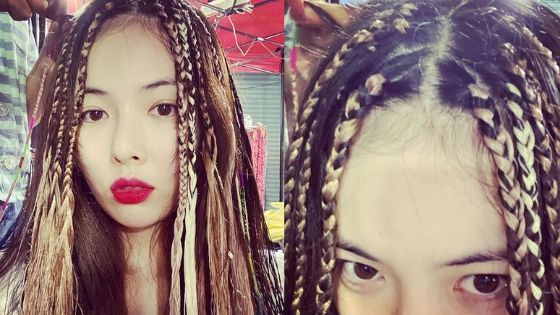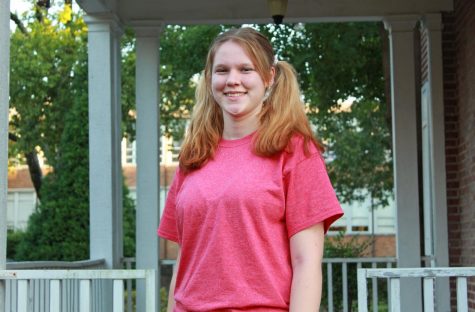It’s not ‘just hair’: HyunA and cultural appropriation in K-pop

K-pop idol HyunA sports half-in “box braids” on a series of recent controversial Instagram posts on her page.
January 30, 2020
Cultural appropriation in K-pop isn’t new, so Korean solo artist HyunA’s appearance on her Instagram sporting half-done “box braids” earlier this month was, while not surprising, controversial to say the least. After posting pictures of her getting the braids done while on vacation to Thailand, as well as pictures of her styling them, HyunA was met with backlash from fans calling her out for cultural appropriation of African culture, many comments telling her to “take those braids out,” “STOP,” and that “the hair has to go.”
While some may be confused how HyunA crossed a line with “just a hairstyle,” it’s important to put it in context with the rest of the K-pop industry, and its long history of cultural insensitivity, to see the depth of the issue. Taken out of its immediate context (the history of K-pop idols using other cultures as accessories and using blatant racism in media), HyunA’s braids could be seen as relatively insignificant. But with so many other idols showing their ignorance (or ignore-ance), HyunA is just another example of Korean media “borrowing” cultures.
One instance of this is the (now disbanded) 2NE1’s lead, CL, who had a long history of using different cultures as “themes” for her music videos, performances and songs. The group used rap in a lot of their music, and they also utilized the culture of rap and African American gangs, most evident in CL’s solo single music video “The Baddest Female” (2013). In the video, themes of gang culture were created through CL–the lead rapper–wearing grills, drawn-on tattoos, bandanas in her hair and covering the singers’ faces, and chains (with lyrics referencing them). The video received over 1 million views in a day, broadcasting the fact that even Korea’s most prominent rappers isn’t scared to use other cultures as props in her performances. The use of black culture in the video simply to look “rough and strong” furthers toxic stereotypes of African Americans in Korean media.
Even further back, in 2009, 2NE1 used Indian culture in their music video “Fire,” in which one of the members showed off their Indian-style clothing through Bollywood-esque moves danced to the South Asian-style melodies in the song, all while wearing bindi (the colored dot worn on the center of the forehead directly tied to the religion and culture of India).
The group has also used verses from the Quran in their song “MTBD” (2016), after which CL apologized and edited the song to remove the controversial lyrics.
Other groups such as older girl group T-ara, who used stereotypical Native American elements (feather headbands, tribal face paint, teepees, and chants), as well as Korean media, which has been known to portray blackface and other insensitive actions, are all part of the larger issue. Another more recent artist, Stray Kids’ member Bang Chan, was in a similar situation as HyunA when he showed up wearing cornrows earlier last year. Even Lisa of BLACKPINK has gotten into a braids controversy for wearing long silver box braids in her “Kill This Love” music video.

Lisa of BLACKPINK shows off her box braids in the official MV of the group’s “Kill This Love.”
And there’s more where that came from.
Knowing just some of the examples in the history of Korean music media, the issue with HyunA wearing braids recently is evident. Given the disturbing acceptance in Korea surrounding idols using cultural appropriation in their music, fans should be able to at least trust their idols to try their best to avoid contributing to the issue, and some may say HyunA has certainly not delivered on that. As a single artist debuting with a new company, HyunA is getting a chance to recreate herself–and with the controversy over her “box braid” photos, it’s off to a less-than-stellar start.
Factor into this her slightly unapologetic apology in a more recent Instagram post, in which she tells her fans (in Korean) to basically just let the matter drop, instead of actually acknowledging the issue. Her dismissiveness in the video is amplified by her sleepy attitude: she filmed the Instagram video while in bed, and ended it with a cutesy (roughly translated) “I’m off to dreamland, bye!” with a little wave. She basically says that we should all try to understand each other and she doesn’t want her fans to say bad things, and that it’s all very hard for her. While it’s understandable for an idol to be weighed down by negative comments, I think she should have put more thought and professionalism into her apology. Her comments seemed offhand, especially where she says that her fans should calm down. She shouldn’t have tried to put the blame on her fans’ sensitivity, and her apology came off as slightly gaslighting.
The prevalence of African-inspired braids in K-pop is obvious, and the severity of the issue is extremely subjective from person to person. Many fans commented on HyunA’s posts of the braids that people were being unreasonable and that it doesn’t matter (citing larger issues to worry about, like climate change), with an equal number of supportive messages among the hate comments.
However, the issue isn’t just about the braids themselves but the education needed to wear them (or know that you shouldn’t). Many Koreans and K-pop idols are jumping on this style without knowing its history and have even changed the name of the braids entirely. Ignorantly dubbed “reggae braids,” Koreans have been getting more into the hairstyles but not educating themselves on the history behind them; this can trigger non-Korean fans who know the history of braids and the still-existing prejudice surrounding African American hair styles in modern culture.
Moreover, since the fanbase of Korean music, namely K-pop, has been gaining traction in the U.S. since the early 2000s, the importance of catering to the sensitivities and diversities of that quickly-expanding audience is also growing. We can only hope that K-pop and its idols like HyunA will educate themselves in the future and seize the immense responsibility that comes with their growing platform.










Nina • Aug 28, 2022 at 12:26 pm
Um forgive me if I am wrong but aren’t those thai khao san braids?
Angie • Sep 4, 2020 at 1:02 pm
I totally stand against any racism behavior. But maybe because I’m from Asia and therefore more “ignorant” to what you called cultural appropriation behaviors, I still don’t fully understand why some people still believe certain race own certain hairstyle, and I truly hope I can find more convincing explanation from you.
It’s quite common to see young people in Asia, not only kpop idols, sing R&B and rap music, braid their hair, wear hip hop style outfit, simply because they really love those music or fashion created by African American artists. It’s different from when back in the time white American did blackface to made fun of African which straighten people’s negative impression toward black people. Today young people in Asia do what you strongly condemn purely out of cultural appreciation. I thought it’s a beautiful thing when somebody learn the beauty of other culture, try to experience it, and even create they own unique style by combining it with their original cultures, because that kinda cultural fusion and recreation happened through out all human history. And that’s how many masterpieces of art, fashion, and music were created.
We don’t seem to have issue when people today drink tea (from China and East Asia) in the morning, do yoga and meditation (from India), hang a dreamcatcher (from native America) in their room…but not okay with braids?? Is it because you guys don’t think those ethnic suffered in racism in America enough as African American did? But then who to define which race has experienced more suffering than the others?
I have a male friend who loves to dress up as a girl. I’m always proud of him because he is brave to show people how he identify himself. But if the logic of “people who never experience certain tragical history doesn’t deserve to borrow element from that culture” makes sense, I should actually be offended by his “gender appropriation” too because his gender never truly experience women persecution in the history and he is “insensitive” to the patriarchal symbols behind those high-heals and bra. But again it just doesn’t make sense to me.
Jay • Dec 24, 2021 at 4:45 am
The reason why we call people out on cultural appropriation is because black people have always been called ‘ a thug’ or ‘unprofessional’ for wearing braids but when a non black person wears it they get called cool and trendy. Some people even had to cut their braids off or they were to be expelled from their school because they looked ‘dirty’ or looked like they had a nest on their head. And we wear braids to protect hair types like ours and they help our hair grow but if a white or Asian person wears it, it can damage their hair because it’s too thin and could rip your hair out. So there’s more to it than just ‘braids’
Angel • Jun 16, 2024 at 7:52 pm
All races get told they look nice or dodgy with plaits. Irs not site-specific.
As for policy it applies to all races. White kids have been sent home from school for canerow.
And plaits are good/bad for all hair types. I grew up plaiting my hair to stop it knotting. Im white. There are plenty of black people with alopecia and receding hairline due to canerowing or locsing up. Also hair loss isnt a legitimate reason to tell others they cant do what they choose with their own hair as its their choice to risk hair loss.